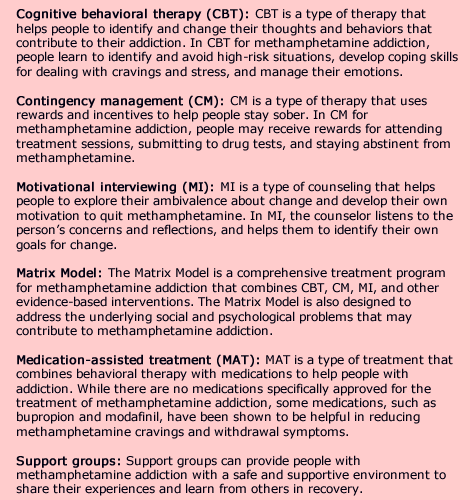Addiction Treatment
At this time there is no FDA
approved pharmacotherapy for the treatment of methamphetamine addiction. The addictive effects of meth are presumed to be due to dopamine receptor down regulation resulting from chronic exposure to meth. A
number of drugs are in animal studies or clinical trials:
- Paroxetine is believed to reduce the craving for meth
- Fluoxitine a selective serotonin reuptake inhibitor seems to decrease the reward effects of meth in animal studies.
- Lobeline decreases self administration of meth in rats
- Syndocarb is a psychostimulant used in Russia for a number of psychiatric disorders. It has psychomotor effects similar to meth but is less toxic and less addictive.
- Monoclonal antibodies and vaccines against meth are being studied in animal models
Acute
methamphetamine treatment focuses on providing supportive treatment in a safe and a quiet environment.
Patients may require a benzodiazepine for anxiety, sodium nitroprusside for severe hypertension,
antipsychotics such as haloperidol to reduce the agitation and psychosis. Urine acidification
with ammonium chloride may be used to accelerate metabolite (amphetamine) excretion.
 Specific methamphetamines addiction treatment protocols: can begin when the client is medically stable, he/she will need evaluation for addiction, and a plan for recovery.
A successful plan may require a multidisciplinary
team including: psychiatrists, physicians, addiction counselors, nutritionists,
social workers, occupational and recreational
therapist, nurses and others, according to
the needs of the
client. (Click graphic to enlarge and again to reduce size).
Specific methamphetamines addiction treatment protocols: can begin when the client is medically stable, he/she will need evaluation for addiction, and a plan for recovery.
A successful plan may require a multidisciplinary
team including: psychiatrists, physicians, addiction counselors, nutritionists,
social workers, occupational and recreational
therapist, nurses and others, according to
the needs of the
client. (Click graphic to enlarge and again to reduce size).
Cognitive, behavioral and psychosocial interventions designed to help modify thinking and behaviors, and to increases abstinence skills in coping with various life stresses, have been found effective.
Most meth addicts will need some type of formal treatment to acheive abstinence. The treatment setting may be a strong cohesiveness with others. The recovering patient ideally develops a support system that can be relied on instead of meth. One important task of treatment
is the identification of triggers that initiate the client's desire for meth. Relapse is a part of the disease of addiction; eventually the addict will have a desire to use meth. A strategy to maintain abstinence needs to be implemented when cravings develop. Support people and groups need to be utilized. In addition some individuals will require psychotherapy to resolve issues or underlying psychiatric
disorders.
Common components of treatment include:
- Skill building to maintain
abstinence
- Education about the disease of addiction to address client's denial
- Involvement in a Recovery group. Similar to the 12 step programs utilized by recovering alcoholics,
these groups provide clear guidelines and social support directed at successful living through abstinence. Initially
the client may attend meetings daily. They will share the impact on their abusing meth on their lives. This sharing facilitates emotional support and promotes a sense of community.
- Selection of a sponsor.
This person is more experienced at abstinence from drugs but is also recovering from drugs or alcohol. Sponsors provide individual support for the client, and help the client work the 12 step program.
The nurse's role in the recovery process:
- Establishing mutually
agreed upon goals that are clearly stated and that delineate the
client's responsibility.
- Provide support
to the client in working through the denial of addiction. The goal is to
help the client realize that
many of the
problems he
is experiencing are due to his/her
meth
use./li>
- Establish a caring,
empathetic relationship to help the client improve self-esteem
and deal with
thoughts
of guilt
and remorse. Many
have neglected
children, abused
spouses, or financially difficulties,
which in guilt and shame.
- Avoid judgmental
behavior; being aware of biases.
- Assist client in expressing
anger constructively
- Encourage client's
effort to re-establish
rapport with families and
significant other.
- Educate client and families about methamphetamines
and the effects on the body.
- Support the client in maintaining involvement
in 12 step program.
- Assist client in recognizing his/her own strengths;
reinforce client
strengths.
- Teach assertiveness skills and adaptive social skills.
- Support significant others in attending a support group, such as Al-Anon. These self-help groups for spouses and friends of the addict provide opportunities to learn about the disease of addiction and to share problems and solutions with other members.
- Occasionally the user chooses not to recover from their meth addiction. In that event significant others need support and assistance from
the community in developing a new life separate from the user.
References
Action is Needed to Explore Ways to Offer an Evidence-Based Treatment for People Who Use Methamphetamine. (2022). https://www.seattle.gov/documents/Departments/CityAuditor/auditreports/Methamphetamine_Audit_Published_10-24-22.pdf
Alghamdi AA. (2023). Cognitive behavioral therapy treatment for drug addiction. J Addict Ther Res.; 7: 005-007.
MOTIVATIONAL INTERVIEWING ASSESSMENT: SUPERVISORY TOOLS FOR ENHANCING PROFICIENCY (MIA:STEP). (n.d.). https://nida.nih.gov/sites/default/files/MIA-STEP_Factsheet.pdf
Medication assisted treatment (MAT). AHCCCS. (n.d.). https://www.azahcccs.gov/Members/BehavioralHealthServices/OpioidUseDisorderAndTreatment/MAT.html
©RnCeus.com
 Specific methamphetamines addiction treatment protocols: can begin when the client is medically stable, he/she will need evaluation for addiction, and a plan for recovery.
A successful plan may require a multidisciplinary
team including: psychiatrists, physicians, addiction counselors, nutritionists,
social workers, occupational and recreational
therapist, nurses and others, according to
the needs of the
client. (Click graphic to enlarge and again to reduce size).
Specific methamphetamines addiction treatment protocols: can begin when the client is medically stable, he/she will need evaluation for addiction, and a plan for recovery.
A successful plan may require a multidisciplinary
team including: psychiatrists, physicians, addiction counselors, nutritionists,
social workers, occupational and recreational
therapist, nurses and others, according to
the needs of the
client. (Click graphic to enlarge and again to reduce size).